Dry eyes are caused by a lack of lubrication and moisture on the surface of the eye for an extended period of time. To keep your eyes healthy, comfortable, and seeing well, you need an adequate and consistent layer of tears on the surface. Tears moisten the eye's surface and wash away dust, dirt, and bacteria that may harm the cornea and cause an infection.
It may be exceedingly painful to have dry eyes, especially while blinking. Dryness can also cause damage to the surface of the eye. This might happen if your tear ducts aren't producing enough tears or if the tears are evaporating too quickly. Dry eyes are a common side effect of ageing and menopause. Excessive screen time, Contact lenses, air pollution, and dry air are among the other factors. However, injury to the tear gland from radiation or burns can also cause it.
The 10 most common causes of dry eye and what you can do about them are as follows:
Ageing
- Dry eye may affect everyone at any age, but it gets more frequent as you get older. Because tear production slows with age, dry eye is more common in adults over the age of 50. Although this sort of problem cannot be avoided, applying artificial tears on a daily basis can help to lubricate your eyes and reduce dryness.
Laser surgery
- Following laser vision correction surgery, some patients have dry eyes. This type of dry eye is usually only temporary, lasting a few days or weeks. Use lubricating eye drops to keep your eyes moist until they recover.
Excessive computer time
- Working on a computer can cause eyestrain and tension headaches in some people. Aside from these difficulties, gazing at a computer for long periods of time might impact your tears and cause dry eyes. This is due to the fact that people who work at a computer display blink less frequently. As a result, their tears are evaporating faster. If you work on a computer, blinking more regularly might help to minimise dryness. Blinking is a good way to keep your eyes lubricated.
Use of contact lens
- Another risk factor for chronic dry eye is long-term contact lens use. This is due to the fact that certain lenses prevent oxygen from reaching the cornea. If your eyes aren't getting enough lubrication, consider wearing eyeglasses and asking your doctor about dry-eye contacts. These lenses are intended to aid in the retention of moisture in your eyes.
Deficiency of Vitamin A
- Vitamin A is good for your eyes. Eggs, broccoli, spinach, and peppers are all high in vitamin A. Dry eye and other visual problems, such as night blindness, can result from a diet lacking in this vitamin. Deficiency can be detected with a blood test. You might also ask your doctor about eye drops.
Smoke
- Smoking or being exposed to second-hand smoke can cause your eyes to get dry. Smoky settings should be avoided, and if you do smoke, you should make efforts to quit. To reduce cravings, try therapy or contact your doctor about a prescription medicine.
Menopause
- Hormones can contribute to dry eye. During pregnancy, menopause, or when using birth control drugs, some women develop dry eye problems. Tear production is stimulated by hormones, therefore an imbalance might diminish tear output. Hormone replacement treatment appears to have little effect on dry eyes. However, you might discuss lubricating eye drops with your doctor to alleviate dryness and discomfort. Small oil glands in your inner eyelid get blocked and irritated, resulting in blepharitis. You may experience greasy particles around your eyelashes in addition to dry eyes.
Blepharitis
- This illness has no known cure. Even so, putting a warm compress to closed eyes for a few minutes and wiping your eyelids with baby shampoo will help alleviate irritation. Use artificial tears to relieve dryness and redness until the irritation subsides. If your symptoms persist, consult your doctor and inquire about antibiotic eye drops.
Humidity
- Dry eyes are exacerbated by dry air. If your home has a low humidity level, or if you sleep or work near an air vent, this might happen. It may help to adjust your bed or workstation so that air does not blow directly into your eyes. It's also a good idea to use a humidifier to keep the air wet and reduce tear evaporation.
Thyroid / Systemic Diseases
- There are certain diseases that cause dryness of the eyes systemtically like Thyroid, PCOD, Diabetes, Rhematoid Arthritis etc. Getting your blood tests done to rule out such systemic conditions is necessary. And in case you are having any of the conditions, proper treatment for the same also helps to reduce the dryness levels of the eyes.
One of the leading dry eye specialists in Mumbai is the Vission Eye Center. They provide expert treatment for eye care such as cataract, lasik, cornea, refraction, glaucoma and a few more. Their contribution to eye treatment excellence is led by the senior doctor Dr. Himanshu Mehta, a world-renowned optical surgeon with over 5,000 refractive treatments done by him. It is at the forefront of progress in corrective eye surgery especially the dry eyes treatment and retains the highest patient care quality.







